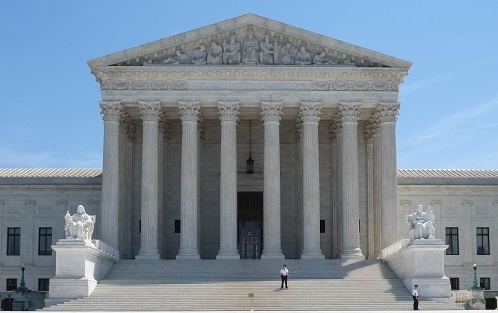Some Catholic leaders have called the Supreme Court’s Janus decision “disappointing.” But a bishop says the Court ruled correctly, both because the union funds immoral activity and because compulsory union dues violate Catholic teachings on the freedom of association.
Illinois government worker Mark Janus sued for the right to sever financial ties with the American Federation of State, County and Municipal Employees (AFSCME).
When the U.S. Conference of Catholic Bishops (USCCB) filed an amicus curiae brief on behalf of ASCME, the bishop of Janus’ local diocese said the document did not represent Catholic social teaching.
“No vote was taken on whether to file such a brief,” said Bp. Thomas Paprocki of Springfield. “While Church teaching clearly supports freedom of association and the right to form and join a union, it does not mandate coercing people to join a union or pay dues against their will.”
Bishop Frank Dewane described the Court’s 5-4 decision as “disappointing,” because it “renders the long-held view of so many bishops constitutionally out-of-bounds.”
But in an online video, Bp. Parocki said, “I respectfully disagree.”
Citing paragraph 57 of Rerum Novarum, he said that “unions should not expect the unquestioning support of the Church when their objectives are contrary to the duties of religion and morality.” He noted that AFSCME contributed $435,000 to Planned Parenthood in 2014, in conjunction with SEIU and the United Food and Commercial Workers. AFSCME, he continued, decried “health care laws [that] have restricted the places where abortions can be performed.” Although the bishop did not mention it, AFSCE President Lee Saunders also described legislation designed to respect the religious liberty of people engaged in commerce as “un-American” and an “embarrassment” which “cannot be tolerated.”
Bp. Paprocki said, “Forcing public employees to subsidize unions that promote such immoral policies and activities is just not right. … No longer will public sector employees be required to pay mandatory dues to support unions that promote abortion and other political issues with which they disagree.”
However, he went beyond criticizing the effect of compulsory union dues to critique the economic coercion itself. “It is encouraging that the U.S. Supreme Court ruling in Janus v. AFSCME upholds the right to be free from coercion in speech,” he said.
(This article continues after the video.)
Bishop Paprocki’s analysis combines the best elements of Catholic teaching and the philosophy of America’s Founding Fathers in an exemplary marriage of faith and liberty.
The Vatican has specifically rejected compulsory unionism. In 2000, the Pontifical Council for the Family cited a person’s right not to join a labor union as “a safeguard against totalitarianism.” Speaking of the Universal Declaration of Human Rights, the council wrote:
The Universal Declaration wisely recognizes that an essential part of the freedom of association – which includes freedom to associate in labor unions – is the right whereby individuals cannot be compelled by the State to join an association. All these rights, which individuals and private associations enjoy, are vital for the development of “civil society.” They constitute a safeguard against totalitarianism. (“The Family and Human Rights.” Emphases in original.)
Freedom – of association, speech, or religion – only exists in the absence of coercion. The freedom of association, which is well-grounded in Catholic social teaching, carries the commensurate freedom to avoid associating with those whose values one loathes.
To this American, Bp. Parocki’s statement echoes the words of Thomas Jefferson, that “to compel a man to furnish contributions of money for the propagation of opinions which he disbelieves and abhors is sinful and tyrannical.”
The bishop’s statement also demonstrates that debate over matters of prudential judgment on which the Magisterium has not spoken exist at the highest levels of the church.
Deacon Keith Fournier praised “the courage of Bishop Paprocki. He demonstrates that, while holding to a principle of Catholic Social teaching, even bishops can, and do disagree on applications.”
Watch “I respectfully disagree” by @diospringfield on #Vimeo https://t.co/4fefXlFhI8
The courage of Bishop Paprocki. He demonstrates that, while holding to a principle of Catholic Social teaching, even Bishop’s can, and DO disagree on applications.— Keith Fournier (@KeithFournier7) July 15, 2018
Acton Institute founder Fr. Robert Sirico had to explain the difference between binding moral and religious pronouncements and non-binding papal statements to former Senator Barbara Boxer during congressional testimony in 2016. (You can read Fr. Sirico’s statement on the Janus ruling here.)
(Photo credit: Paul Sableman. This photo has been cropped. CC BY 2.0.)
